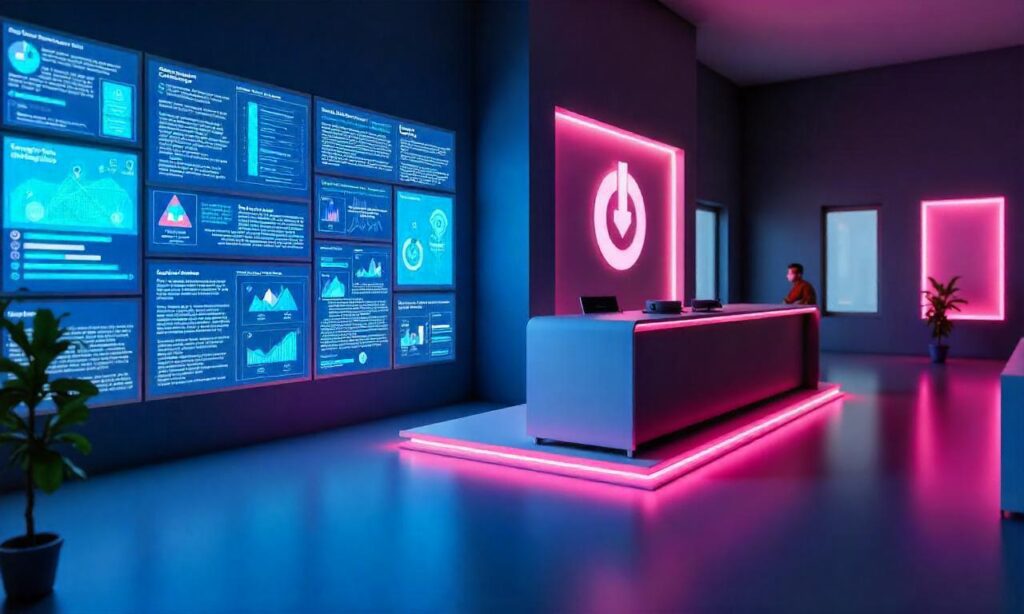How Technology Improves Daily Life Efficiency: Top Benefits

# How Technology Improves Daily Life Efficiency: Top Benefits
In today’s fast-paced world, technology plays a pivotal role in enhancing daily life efficiency. From streamlining mundane tasks to revolutionizing how we communicate and manage our time, the integration of digital tools has transformed the way we live and work. The phrase *how technology improves daily life efficiency* encapsulates the essence of this evolution, as modern advancements continuously provide innovative solutions to optimize productivity, reduce effort, and enhance overall quality of life. Whether it’s automating household chores or using smart devices to manage schedules, technology is the driving force behind smarter, more efficient living. This article explores the top benefits of how technology improves daily life efficiency, covering automation, communication, productivity, time management, and health.
## Automation and Smart Devices
Automation has become one of the most impactful ways technology improves daily life efficiency. By taking over repetitive tasks, smart devices and automated systems allow individuals to focus on more meaningful activities.
### 1. Smart Home Devices Smart home devices, such as thermostats, lighting systems, and security cameras, are designed to simplify daily routines. These technologies can be controlled via mobile apps or voice commands, reducing the need for manual effort. For example, a smart thermostat automatically adjusts the temperature based on user preferences and external weather conditions, saving energy and time. Similarly, smart locks enable remote access to homes, eliminating the need for physical keys.
#### Automation in Daily Tasks Automation is not limited to home devices; it extends to various aspects of daily life. From voice-activated assistants like Amazon Alexa to smart kitchen appliances, technology has made it possible to streamline tasks with minimal input. A smart refrigerator, for instance, can monitor inventory and suggest recipes based on available ingredients, reducing food waste and saving time.
##### Real-Time Adjustments The ability of smart devices to make real-time adjustments is a game-changer for efficiency. These devices use sensors and data analytics to anticipate user needs and act accordingly. This level of automation not only reduces manual labor but also ensures that household systems operate optimally, contributing to energy savings and cost reduction.
## Communication and Connectivity
The way we communicate has evolved significantly with the advent of digital technologies. Faster and more reliable communication tools have made it easier to stay connected with others, regardless of location.
### 2. Video Conferencing Tools Platforms like Zoom, Microsoft Teams, and Google Meet have transformed remote communication, making it as effective as in-person interactions. These tools allow for real-time collaboration, eliminating the need for travel and reducing time spent on meetings.
#### 3. Messaging and Social Media Modern messaging apps and social media platforms have made communication more accessible and efficient. Features such as instant messaging, group chats, and file sharing enable quick information exchange, even across different time zones. For example, WhatsApp and Facebook Messenger allow users to send voice notes, images, and documents instantly, enhancing productivity in both personal and professional contexts.
##### 4. Instant Access to Information The internet has revolutionized how we access and share information. Search engines like Google and Bing provide instant answers to questions, while social media platforms like Twitter and LinkedIn enable real-time updates and networking. This constant connectivity ensures that people can stay informed and make decisions more quickly.
## Productivity Tools and Efficiency Gains
Productivity tools have become essential in improving daily life efficiency. These technologies help individuals manage their workloads, reduce errors, and save time.
### 5. Cloud Storage and File Management Cloud storage solutions like Google Drive, Dropbox, and OneDrive allow users to store and access files from anywhere, eliminating the need for physical storage devices. This not only saves space but also ensures real-time collaboration and backup capabilities, reducing the risk of data loss.
#### 6. Project Management Software Project management tools such as Trello, Asana, and Notion have made it easier to organize tasks and deadlines. These platforms offer features like task delegation, progress tracking, and team communication, enabling individuals and teams to work more efficiently. For instance, Trello uses a visual board system to help users prioritize and manage their workflows.
##### 7. Automation in Workflows Workflow automation tools, such as Zapier and IFTTT, enable users to connect different applications and automate repetitive tasks. By setting up automated triggers, individuals can save hours of manual work each week. For example, a Zapier integration can automatically send an email confirmation when a customer places an order, streamlining the process for businesses.
## Time Management and Scheduling
Effective time management is crucial for maximizing efficiency, and technology has provided powerful tools to help individuals and organizations manage their schedules more effectively.
### 8. Digital Calendars and Scheduling Digital calendars, such as Google Calendar and Outlook, have replaced traditional paper planners. These tools allow users to set reminders, sync across devices, and share events with others. The integration of AI-powered scheduling assistants further enhances this by suggesting optimal meeting times based on availability.
#### 9. Task Management Applications Task management apps like Todoist, Eisenhower Matrix, and Microsoft To-Do help users prioritize their tasks and allocate time more efficiently. These platforms offer features such as priority tagging, due date reminders, and progress tracking, enabling individuals to stay on top of their responsibilities.

##### 10. Time Tracking and Analytics Time tracking tools, such as Toggl and Harvest, provide insights into how time is spent throughout the day. By analyzing usage patterns and productivity metrics, users can identify inefficiencies and optimize their workflows. For example, Harvest offers detailed reports on time allocation, helping professionals manage their hours more effectively.
## Health and Wellness Improvements
Technology has also played a significant role in improving health and wellness, making it easier for individuals to maintain a balanced lifestyle and manage medical needs efficiently.
### 11. Wearable Health Devices Wearable technology, such as smartwatches and fitness trackers, has revolutionized personal health monitoring. Devices like the Apple Watch and Fitbit offer real-time health data, including heart rate, sleep patterns, and activity levels, helping users make informed decisions about their well-being.
#### 12. Telemedicine and Remote Healthcare Telemedicine platforms have made healthcare more accessible and efficient. Patients can consult with doctors remotely through apps like Teladoc and Amwell, reducing the need for in-person visits and saving time. This is particularly beneficial for individuals with busy schedules or limited access to healthcare facilities.
##### 13. Mental Health and Stress Management Technology also aids in mental health and stress management. Apps like Headspace and Calm provide guided meditation, stress-relief techniques, and sleep training, helping users maintain their mental well-being. Additionally, AI chatbots like Woebot offer instant support for anxiety and depression, making mental health resources more widely available.
## Future Trends in Technology and Efficiency
As technology continues to evolve, new innovations are set to further enhance daily life efficiency.
### 14. Artificial Intelligence Integration Artificial intelligence (AI) is expected to play a major role in the future of efficiency. AI-powered devices and systems can predict user behavior, automate complex tasks, and provide personalized recommendations. For example, AI assistants will likely become even more adept at managing schedules, optimizing energy use, and even assisting with decision-making.
#### 15. Internet of Things (IoT) Expansion The Internet of Things (IoT) will continue to expand, connecting more devices and enabling seamless automation. From smart appliances to connected vehicles, IoT technology will further reduce manual effort and enhance operational efficiency.
##### 16. 5G and Faster Connectivity The rollout of 5G technology will significantly improve connectivity and reduce latency in data transmission. This will enable faster access to information, smoother remote collaboration, and more efficient smart device interactions, ultimately contributing to higher productivity and convenience.
## FAQ Section
### Q1: How does technology improve daily life efficiency? Technology improves daily life efficiency by automating tasks, streamlining communication, and providing tools for better time management and productivity. For example, smart devices can handle repetitive chores, while digital platforms enable instant access to information and real-time collaboration.
### Q2: What are the top benefits of using automation in daily life? The top benefits of automation include time savings, reduced human error, and enhanced convenience. Automated systems handle tasks like scheduling, data entry, and home management, allowing individuals to focus on more complex activities.
### Q3: How can productivity tools help in improving efficiency? Productivity tools help by organizing tasks, reducing manual effort, and providing real-time analytics. Apps like Trello and Notion offer features for task delegation, progress tracking, and team coordination, ensuring that workflows are optimized.
### Q4: Are there any challenges in adopting technology for efficiency? Yes, challenges include initial costs, learning curves, and privacy concerns. However, the long-term benefits often outweigh these challenges, especially when the tools are integrated into daily routines.
### Q5: What role will AI play in future efficiency improvements? AI will enhance efficiency by predicting user behavior, automating complex tasks, and providing personalized recommendations. It will also improve decision-making processes and optimize resource allocation in both personal and professional settings.
| Feature | Traditional Method | Technology-Enabled Method | Efficiency Gain | |——–|——————-|————————–|——————| | Task Management | Paper planners and sticky notes | Digital calendars and apps like Trello | 50% faster task tracking | | Communication | In-person meetings and phone calls | Video conferencing and messaging apps | 70% reduction in travel time | | Home Automation | Manual control of devices | Smart home systems with voice commands | 30% energy savings | | File Management | Physical storage and folders | Cloud storage and synchronization | Instant access and backup | | Time Tracking | Manual logbooks | AI-powered analytics and time tracking apps | 40% more accurate tracking |
## Conclusion
The integration of technology into daily life has revolutionized the way we live, work, and interact with the world around us. By automating tasks, enhancing communication, and providing tools for better time management and productivity, technology improves daily life efficiency in profound ways. Whether it’s through smart home devices that simplify household chores or AI-powered scheduling assistants that optimize personal and professional workflows, the benefits are undeniable. As advancements continue, the potential for further efficiency gains is immense. The future of technology promises even more innovative solutions, making daily life more convenient, cost-effective, and sustainable. With the right tools and mindset, individuals and organizations can harness these technologies to maximize productivity and minimize effort in everyday activities.
Summary: This article explores how technology enhances daily life efficiency through automation, communication, productivity tools, time management, and health improvements. By integrating smart devices and digital platforms, individuals can save time, reduce errors, and streamline tasks. The use of AI, cloud storage, and real-time analytics further optimizes workflows and decision-making. With the right tools and strategies, technology not only makes daily routines more efficient but also improves overall quality of life. The future of efficiency lies in innovative solutions that make task management, home automation, and personal productivity seamless and sustainable.
